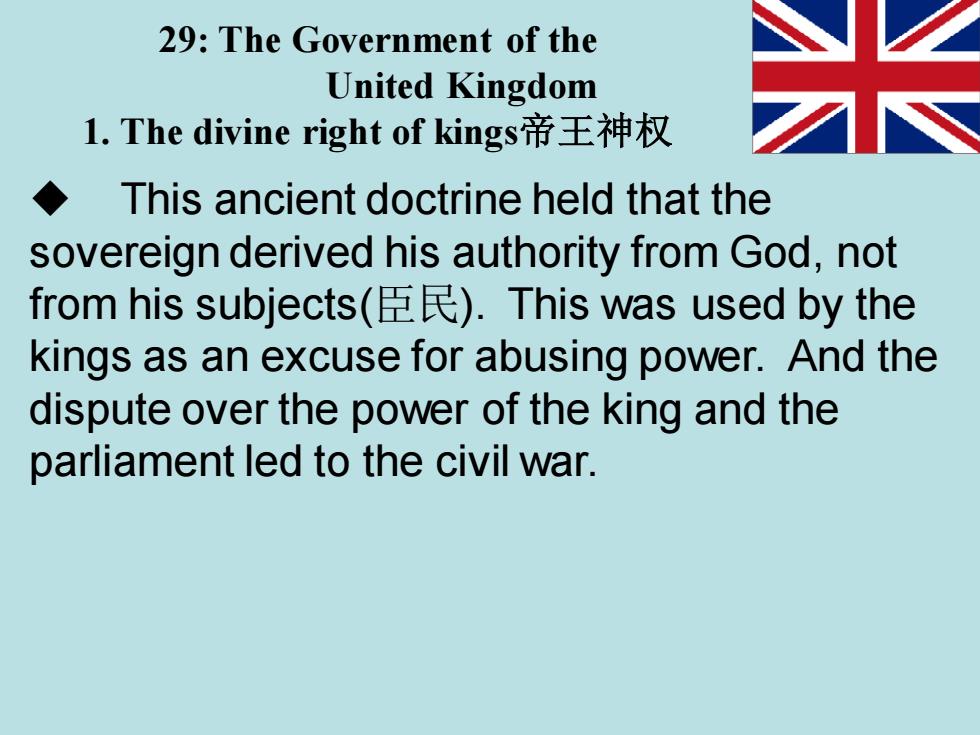
29:The Government of the United Kingdom l.The divine right of kings帝王神权 This ancient doctrine held that the sovereign derived his authority from God,not from his subjects(臣民).This was used by the kings as an excuse for abusing power.And the dispute over the power of the king and the parliament led to the civil war
29: The Government of the United Kingdom 1. The divine right of kings帝王神权 ◆ This ancient doctrine held that the sovereign derived his authority from God, not from his subjects(臣民). This was used by the kings as an excuse for abusing power. And the dispute over the power of the king and the parliament led to the civil war
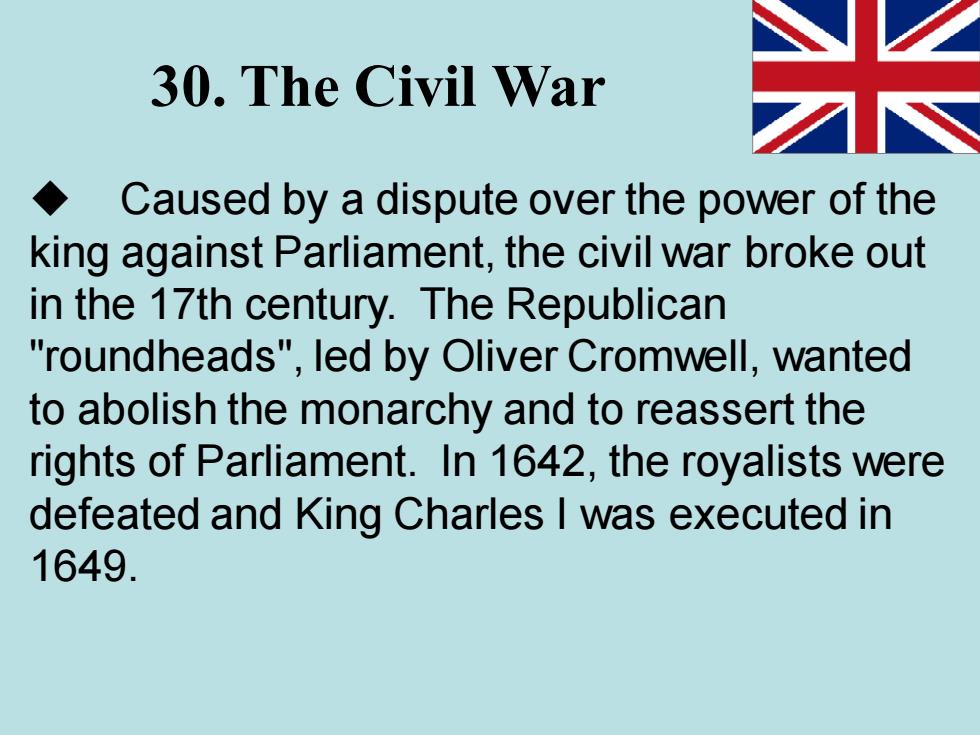
30.The Civil War ◆ Caused by a dispute over the power of the king against Parliament,the civil war broke out in the 17th century.The Republican "roundheads",led by Oliver Cromwell,wanted to abolish the monarchy and to reassert the rights of Parliament.In 1642,the royalists were defeated and King Charles I was executed in 1649
30. The Civil War ◆ Caused by a dispute over the power of the king against Parliament, the civil war broke out in the 17th century. The Republican "roundheads", led by Oliver Cromwell, wanted to abolish the monarchy and to reassert the rights of Parliament. In 1642, the royalists were defeated and King Charles I was executed in 1649
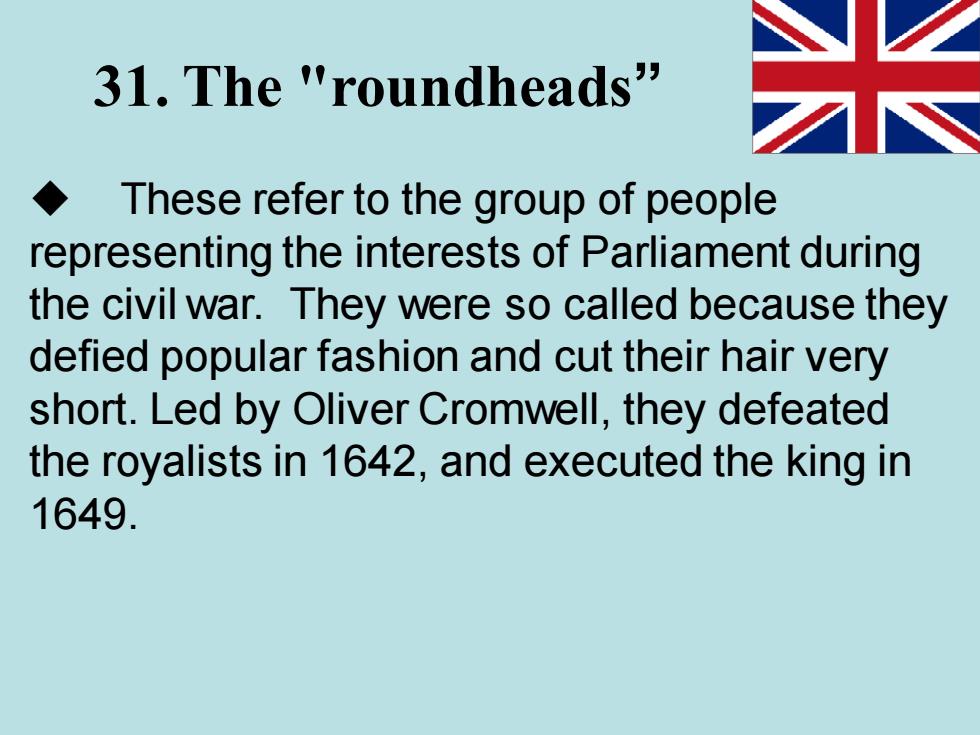
31.The "roundheads" These refer to the group of people representing the interests of Parliament during the civil war.They were so called because they defied popular fashion and cut their hair very short.Led by Oliver Cromwell,they defeated the royalists in 1642,and executed the king in 1649
31. The "roundheads” ◆ These refer to the group of people representing the interests of Parliament during the civil war. They were so called because they defied popular fashion and cut their hair very short. Led by Oliver Cromwell, they defeated the royalists in 1642, and executed the king in 1649
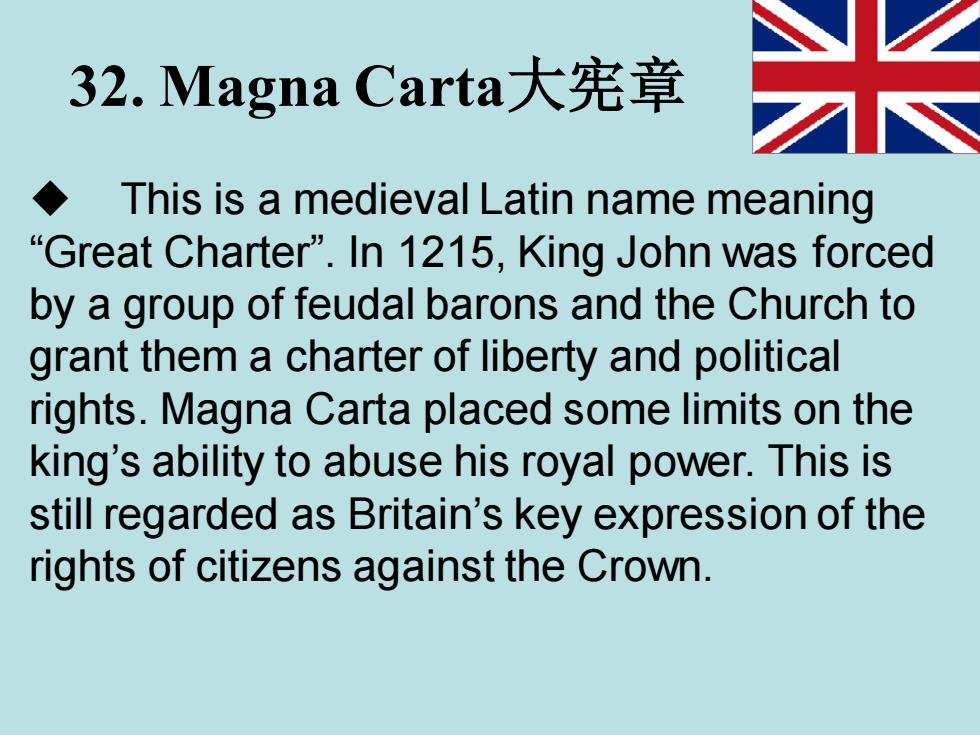
32.Magna Carta大宪章 This is a medieval Latin name meaning “Great Charter'”.ln1215,King John was forced by a group of feudal barons and the Church to grant them a charter of liberty and political rights.Magna Carta placed some limits on the king's ability to abuse his royal power.This is still regarded as Britain's key expression of the rights of citizens against the Crown
32. Magna Carta大宪章 ◆ This is a medieval Latin name meaning “Great Charter”. In 1215, King John was forced by a group of feudal barons and the Church to grant them a charter of liberty and political rights. Magna Carta placed some limits on the king’s ability to abuse his royal power. This is still regarded as Britain’s key expression of the rights of citizens against the Crown
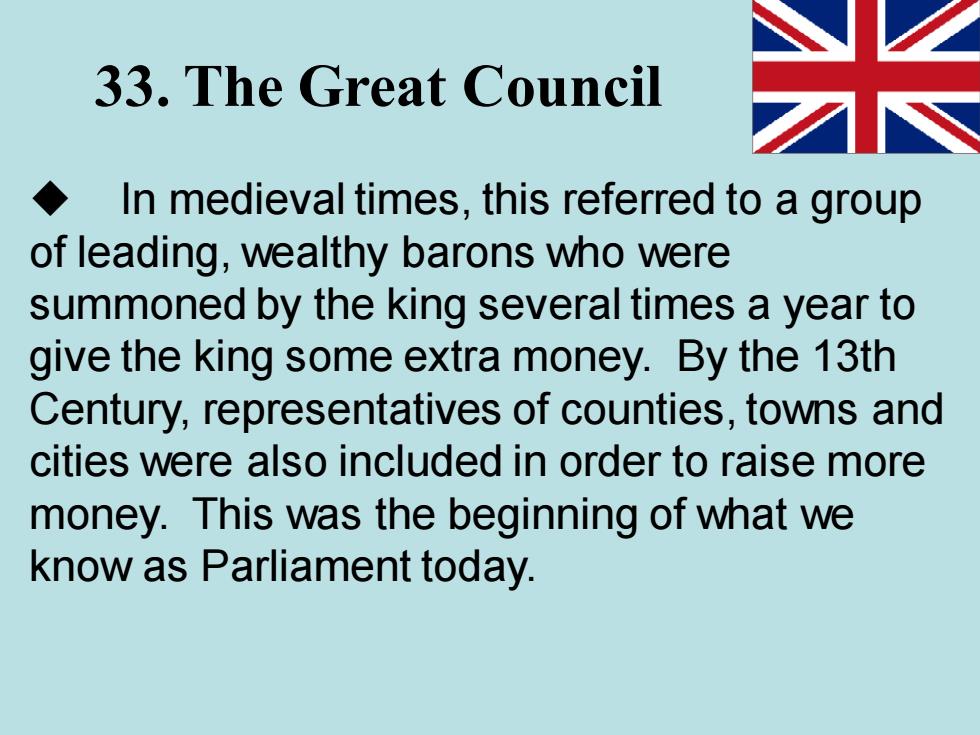
33.The Great Council ◆ In medieval times,this referred to a group of leading,wealthy barons who were summoned by the king several times a year to give the king some extra money.By the 13th Century,representatives of counties,towns and cities were also included in order to raise more money.This was the beginning of what we know as Parliament today
33. The Great Council ◆ In medieval times, this referred to a group of leading, wealthy barons who were summoned by the king several times a year to give the king some extra money. By the 13th Century, representatives of counties, towns and cities were also included in order to raise more money. This was the beginning of what we know as Parliament today
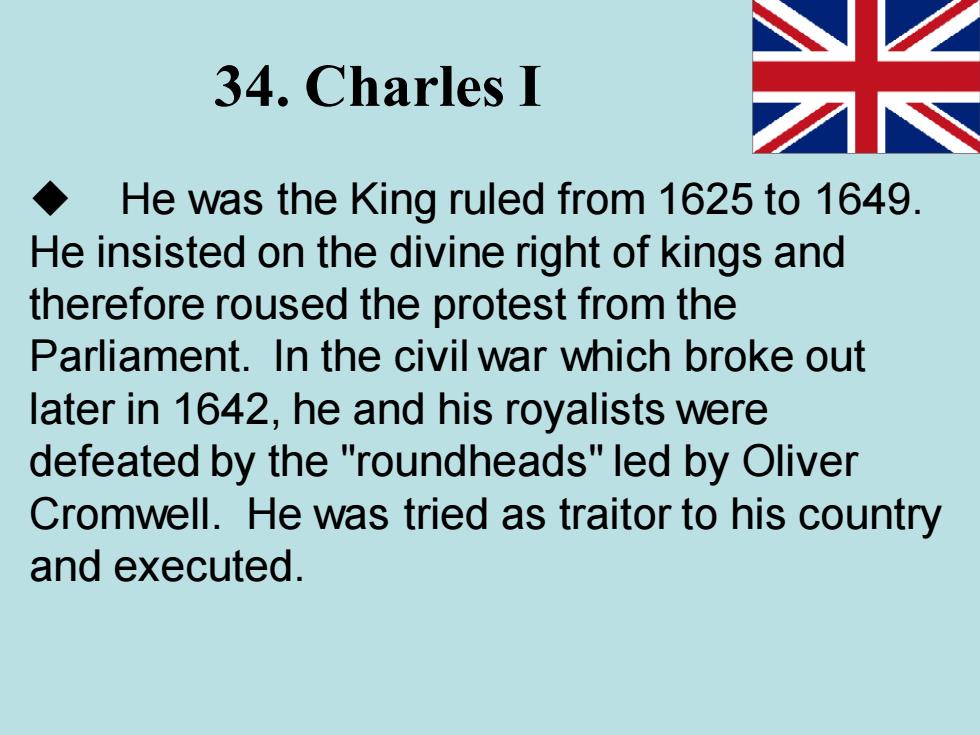
34.Charles I ◆ He was the King ruled from 1625 to 1649. He insisted on the divine right of kings and therefore roused the protest from the Parliament.In the civil war which broke out later in 1642,he and his royalists were defeated by the "roundheads"led by Oliver Cromwell.He was tried as traitor to his country and executed
34. Charles I ◆ He was the King ruled from 1625 to 1649. He insisted on the divine right of kings and therefore roused the protest from the Parliament. In the civil war which broke out later in 1642, he and his royalists were defeated by the "roundheads" led by Oliver Cromwell. He was tried as traitor to his country and executed
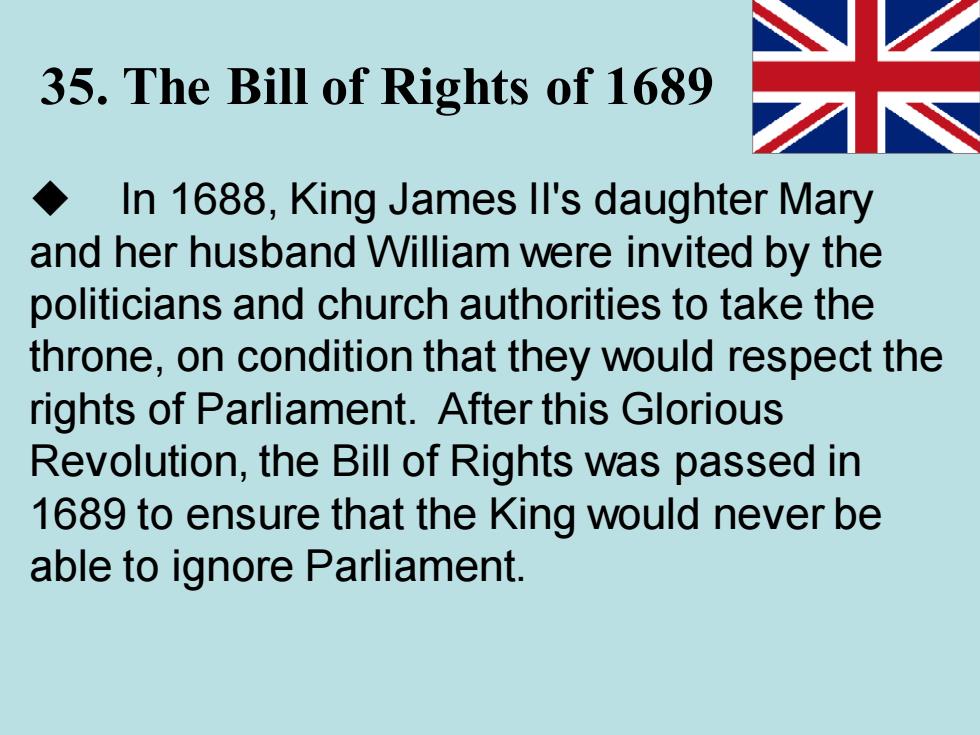
35.The Bill of Rights of 1689 In 1688,King James Il's daughter Mary and her husband William were invited by the politicians and church authorities to take the throne,on condition that they would respect the rights of Parliament.After this Glorious Revolution,the Bill of Rights was passed in 1689 to ensure that the King would never be able to ignore Parliament
35. The Bill of Rights of 1689 ◆ In 1688, King James II's daughter Mary and her husband William were invited by the politicians and church authorities to take the throne, on condition that they would respect the rights of Parliament. After this Glorious Revolution, the Bill of Rights was passed in 1689 to ensure that the King would never be able to ignore Parliament
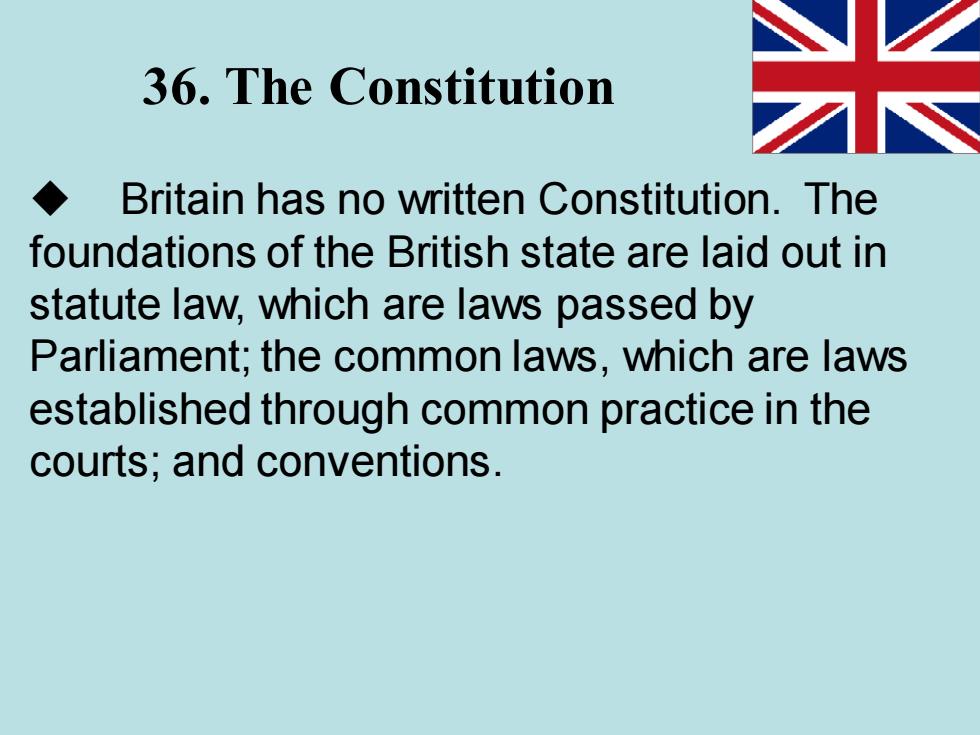
36.The Constitution Britain has no written Constitution.The foundations of the British state are laid out in statute law,which are laws passed by Parliament;the common laws,which are laws established through common practice in the courts:and conventions
36. The Constitution ◆ Britain has no written Constitution. The foundations of the British state are laid out in statute law, which are laws passed by Parliament; the common laws, which are laws established through common practice in the courts; and conventions
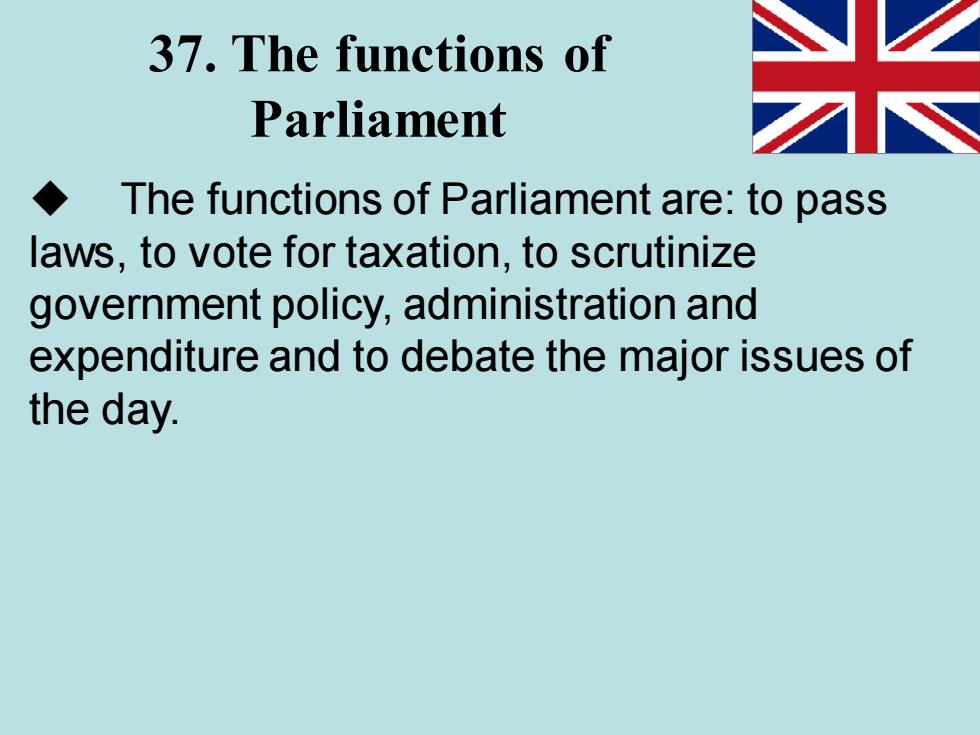
37.The functions of Parliament The functions of Parliament are:to pass laws,to vote for taxation,to scrutinize government policy,administration and expenditure and to debate the major issues of the day
37. The functions of Parliament ◆ The functions of Parliament are: to pass laws, to vote for taxation, to scrutinize government policy, administration and expenditure and to debate the major issues of the day
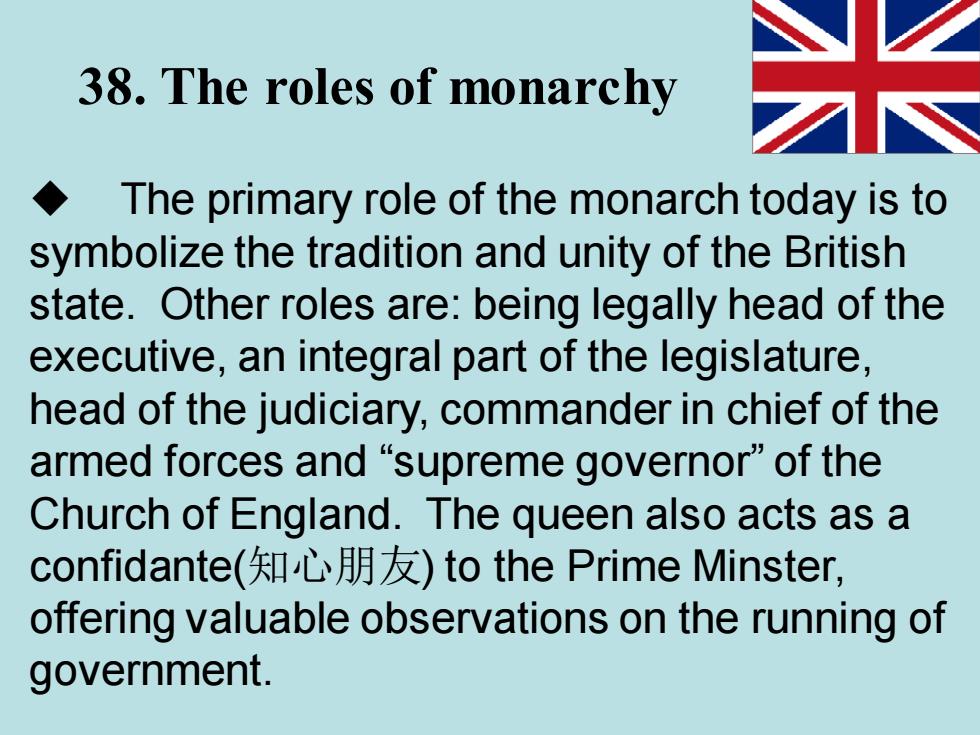
38.The roles of monarchy The primary role of the monarch today is to symbolize the tradition and unity of the British state.Other roles are:being legally head of the executive,an integral part of the legislature, head of the judiciary,commander in chief of the armed forces and "supreme governor"of the Church of England.The queen also acts as a confidante(知心朋友)to the Prime Minster,. offering valuable observations on the running of government
38. The roles of monarchy ◆ The primary role of the monarch today is to symbolize the tradition and unity of the British state. Other roles are: being legally head of the executive, an integral part of the legislature, head of the judiciary, commander in chief of the armed forces and “supreme governor” of the Church of England. The queen also acts as a confidante(知心朋友) to the Prime Minster, offering valuable observations on the running of government